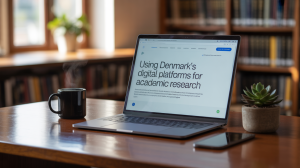A Guide to Denmark’s Innovative Learning Methods
Student-Centered Learning Environment
In Denmark, the educational system is purposefully designed to cultivate creativity, innovation, and analytical thinking skills. Unlike traditional educational settings that often rely on rote memorization, Danish institutions prioritize a student-centered approach.
Key Features:
- Active Participation: Students are encouraged to take an active role in their education, setting personal learning goals and pursuing subjects that genuinely interest them.
- Facilitator Role of Educators: Teachers act as facilitators and mentors, guiding students rather than dictating the learning path. This methodology empowers students to explore and engage with the material more deeply.
Innovative Teaching Methods
The Flipped Classroom Model
One of the most recognized teaching methods in Danish education is the flipped classroom. This innovative approach is characterized by moving traditional lectures outside the classroom, allowing for more interactive and engaging learning experiences within the classroom itself.
Benefits:
- Enhanced Engagement: By dedicating classroom time for discussions, problem-solving activities, and hands-on projects, students can engage more meaningfully with the material.
- Active Learning: This method promotes active inquiry and the development of critical thinking skills.
Real-World Application
Danish higher education emphasizes the importance of real-world applicability. Traditional lectures are often complemented by:
- Industrial Collaborations: Programs frequently involve partnerships with businesses, allowing students to work on real challenges.
- Hands-On Projects: Learning is integrated with practical applications, preparing graduates to navigate their professional fields effectively.
Collaborative Learning and Teamwork
Collaboration is integral to the Danish educational model. Students routinely engage in group projects designed to foster teamwork and simulate real-world collaborative environments.
Impact on Skill Development:
- Essential Soft Skills: Participation in team-based projects helps in honing essential skills such as communication, negotiation, and leadership.
- Real-World Readiness: These experiences prepare students not only academically but also socially and professionally, essential in today’s job market.
Hands-On Experience
Danish education places a strong emphasis on experiential learning. Academic programs often incorporate:
- Internships: Students gain valuable work experience through internships with companies and organizations.
- Laboratory Work and Field Studies: These practical components enhance theoretical knowledge, providing students with essential skills that employers highly value.
Critical Thinking Development
One of the most distinctive aspects of Denmark’s educational approach is its focus on developing critical thinking and reflective skills in students.
Advantages of Critical Thinking:
- Encouragement to Question Norms: Students learn to question established ideas and analyze information from various perspectives.
- Independence in Learning: This nurtures independent viewpoints, preparing graduates to become innovative problem-solvers in their future careers.
Global Partnerships and Innovation
Danish higher education institutions maintain robust partnerships with public research institutions and businesses, facilitating a globally relevant educational experience.
Benefits of Global Collaborations:
- Access to Cutting-Edge Knowledge: These partnerships ensure that education and research reflect the latest developments to meet the needs of an increasingly global world.
- Broader Opportunities for Students: Collaborative projects often provide avenues for students to engage in international research and networking.
Finding Your Program
With over 600 English-taught study programs available across Denmark’s higher education institutions, international students have a wealth of options tailored to their academic interests and career goals. These programs are:
- Aligned with High Standards: The quality of education is consistently emphasized, reflecting both Danish values and international benchmarks.
- Industry-Integrated: Many programs incorporate insights and expertise from industry experts, often including internship opportunities with leading companies.
Conclusion
Denmark offers a safe, innovation-driven educational environment that transcends traditional boundaries, preparing students for real-world challenges through creativity, critical thinking, and practical application. The country’s commitment to a student-centered approach ensures that international students receive a unique educational experience designed to foster development and success.
Take the Next Step with Study in Denmark
If you are interested in learning more about studying in Denmark or exploring partnership opportunities, please contact us at Study in Denmark. We welcome the opportunity to support your educational goals and connect you with the right institutions.



